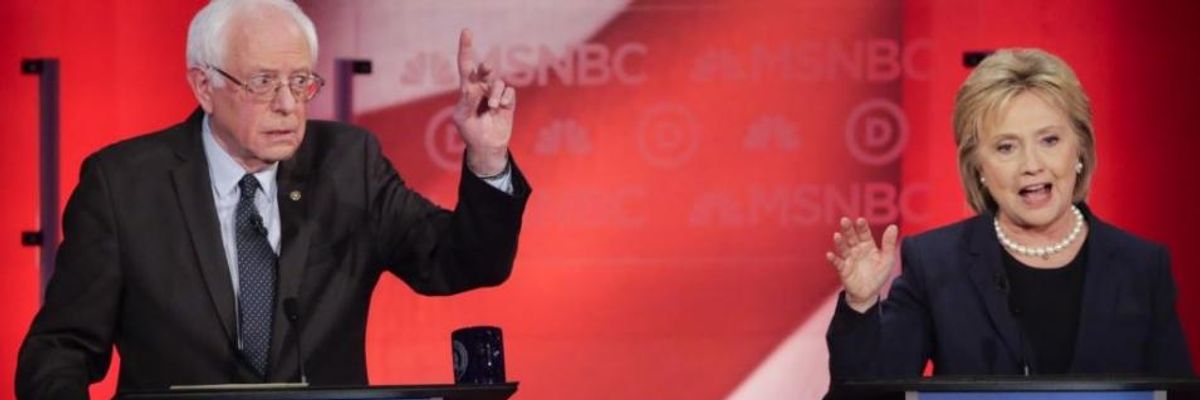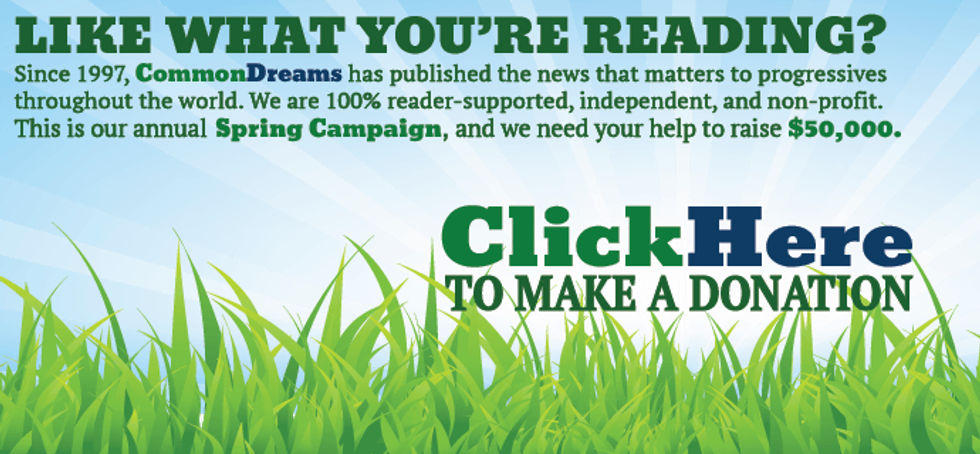

SUBSCRIBE TO OUR FREE NEWSLETTER
Daily news & progressive opinion—funded by the people, not the corporations—delivered straight to your inbox.
5
#000000
#FFFFFF
To donate by check, phone, or other method, see our More Ways to Give page.


Daily news & progressive opinion—funded by the people, not the corporations—delivered straight to your inbox.

Democratic presidential candidate Senator Bernie Sanders and former Secretary of State Hillary Clinton spar during a presidential primary debate at the University of New Hampshire in Durham, Feb. 4, 2016. (Photo: AP)
As Democratic-insider "super-delegates" give Hillary Clinton a seemingly insurmountable lead for the presidential nomination, the former Secretary of State's negative ratings continue to soar to stunning levels, hitting a net 24-point unfavorable in the new NBC-Wall Street Journal poll.
It is hard to imagine someone who is viewed unfavorably by a clear majority of voters (56 percent) and with a net-negative of 24 points winning the White House, except that most voters also don't like the top Republican choices either. Donald Trump sports a 41-point net-negative and Sen. Ted Cruz is at minus-23 points. (By contrast, of the two trailing candidates, Sen. Bernie Sanders gets a net-positive 9 points and Gov. John Kasich a net-positive 12 points.)
But a major difference between Trump and Clinton in the latest poll is that Trump's numbers haven't moved much while Clinton's net-negative has almost doubled in the last month. In other words, the more Americans get to see of Clinton the more they don't want her.
While Clinton's dismal approval ratings haven't seemed to have shaken the Democratic establishment, which continues to line up behind her long-anticipated coronation, some outside analysts see the party leaders blindly marching toward a cliff.

Despite Sanders's string of victories, Clinton still leads him in elected delegates, but her daunting lead comes from her dominance of "super-delegates," party insiders who are not chosen by primaries or caucuses but still get to vote at the convention. According to The Associated Press tally, Clinton has 1,289 elected delegates to Sanders's 1,045, but she has the backing of 469 "super-delegates" to Sanders's 31. To win requires 2,383 delegates.
So, if Clinton's eventual nomination is inevitable, the Democrats will be putting up a candidate who is broadly disliked by the American people. That means a Clinton candidacy will require massive spending on negative ads to make the Republican candidate so frightening in the eyes of most Americans that they will vote for Clinton out of fear, not hope.
There's also the irony that although most attention has focused on the Republican need for a brokered convention - to block a Trump nomination - an argument could be made that the Democrats would benefit from a brokered convention themselves.
If neither Clinton nor Sanders could clinch the nomination on the first ballot, that could open the process to allow the party to select an alternative who has not been in the race, someone such as Sen. Elizabeth Warren, an economic populist who is beloved by Sanders's backers and a woman who might be acceptable to Clinton supporters wanting the first female President.
Still, such a possibility does not appear to be in the cards. The odds remain heavily weighted in favor of Clinton securing the nomination and the Democrats then trying to make the best of her soaring unfavorable numbers.
In a 2008 debate, addressing a question about Clinton's high negatives, then-Sen. Barack Obama condescending opined that "you're likable enough, Hillary." But it turns out Obama may have been overstating the case. With her current unfavorable level at 56 percent - and only 32 percent holding a favorable view - many voters seem to be saying, she's not likable enough.
Trump and Musk are on an unconstitutional rampage, aiming for virtually every corner of the federal government. These two right-wing billionaires are targeting nurses, scientists, teachers, daycare providers, judges, veterans, air traffic controllers, and nuclear safety inspectors. No one is safe. The food stamps program, Social Security, Medicare, and Medicaid are next. It’s an unprecedented disaster and a five-alarm fire, but there will be a reckoning. The people did not vote for this. The American people do not want this dystopian hellscape that hides behind claims of “efficiency.” Still, in reality, it is all a giveaway to corporate interests and the libertarian dreams of far-right oligarchs like Musk. Common Dreams is playing a vital role by reporting day and night on this orgy of corruption and greed, as well as what everyday people can do to organize and fight back. As a people-powered nonprofit news outlet, we cover issues the corporate media never will, but we can only continue with our readers’ support. |
As Democratic-insider "super-delegates" give Hillary Clinton a seemingly insurmountable lead for the presidential nomination, the former Secretary of State's negative ratings continue to soar to stunning levels, hitting a net 24-point unfavorable in the new NBC-Wall Street Journal poll.
It is hard to imagine someone who is viewed unfavorably by a clear majority of voters (56 percent) and with a net-negative of 24 points winning the White House, except that most voters also don't like the top Republican choices either. Donald Trump sports a 41-point net-negative and Sen. Ted Cruz is at minus-23 points. (By contrast, of the two trailing candidates, Sen. Bernie Sanders gets a net-positive 9 points and Gov. John Kasich a net-positive 12 points.)
But a major difference between Trump and Clinton in the latest poll is that Trump's numbers haven't moved much while Clinton's net-negative has almost doubled in the last month. In other words, the more Americans get to see of Clinton the more they don't want her.
While Clinton's dismal approval ratings haven't seemed to have shaken the Democratic establishment, which continues to line up behind her long-anticipated coronation, some outside analysts see the party leaders blindly marching toward a cliff.

Despite Sanders's string of victories, Clinton still leads him in elected delegates, but her daunting lead comes from her dominance of "super-delegates," party insiders who are not chosen by primaries or caucuses but still get to vote at the convention. According to The Associated Press tally, Clinton has 1,289 elected delegates to Sanders's 1,045, but she has the backing of 469 "super-delegates" to Sanders's 31. To win requires 2,383 delegates.
So, if Clinton's eventual nomination is inevitable, the Democrats will be putting up a candidate who is broadly disliked by the American people. That means a Clinton candidacy will require massive spending on negative ads to make the Republican candidate so frightening in the eyes of most Americans that they will vote for Clinton out of fear, not hope.
There's also the irony that although most attention has focused on the Republican need for a brokered convention - to block a Trump nomination - an argument could be made that the Democrats would benefit from a brokered convention themselves.
If neither Clinton nor Sanders could clinch the nomination on the first ballot, that could open the process to allow the party to select an alternative who has not been in the race, someone such as Sen. Elizabeth Warren, an economic populist who is beloved by Sanders's backers and a woman who might be acceptable to Clinton supporters wanting the first female President.
Still, such a possibility does not appear to be in the cards. The odds remain heavily weighted in favor of Clinton securing the nomination and the Democrats then trying to make the best of her soaring unfavorable numbers.
In a 2008 debate, addressing a question about Clinton's high negatives, then-Sen. Barack Obama condescending opined that "you're likable enough, Hillary." But it turns out Obama may have been overstating the case. With her current unfavorable level at 56 percent - and only 32 percent holding a favorable view - many voters seem to be saying, she's not likable enough.
As Democratic-insider "super-delegates" give Hillary Clinton a seemingly insurmountable lead for the presidential nomination, the former Secretary of State's negative ratings continue to soar to stunning levels, hitting a net 24-point unfavorable in the new NBC-Wall Street Journal poll.
It is hard to imagine someone who is viewed unfavorably by a clear majority of voters (56 percent) and with a net-negative of 24 points winning the White House, except that most voters also don't like the top Republican choices either. Donald Trump sports a 41-point net-negative and Sen. Ted Cruz is at minus-23 points. (By contrast, of the two trailing candidates, Sen. Bernie Sanders gets a net-positive 9 points and Gov. John Kasich a net-positive 12 points.)
But a major difference between Trump and Clinton in the latest poll is that Trump's numbers haven't moved much while Clinton's net-negative has almost doubled in the last month. In other words, the more Americans get to see of Clinton the more they don't want her.
While Clinton's dismal approval ratings haven't seemed to have shaken the Democratic establishment, which continues to line up behind her long-anticipated coronation, some outside analysts see the party leaders blindly marching toward a cliff.

Despite Sanders's string of victories, Clinton still leads him in elected delegates, but her daunting lead comes from her dominance of "super-delegates," party insiders who are not chosen by primaries or caucuses but still get to vote at the convention. According to The Associated Press tally, Clinton has 1,289 elected delegates to Sanders's 1,045, but she has the backing of 469 "super-delegates" to Sanders's 31. To win requires 2,383 delegates.
So, if Clinton's eventual nomination is inevitable, the Democrats will be putting up a candidate who is broadly disliked by the American people. That means a Clinton candidacy will require massive spending on negative ads to make the Republican candidate so frightening in the eyes of most Americans that they will vote for Clinton out of fear, not hope.
There's also the irony that although most attention has focused on the Republican need for a brokered convention - to block a Trump nomination - an argument could be made that the Democrats would benefit from a brokered convention themselves.
If neither Clinton nor Sanders could clinch the nomination on the first ballot, that could open the process to allow the party to select an alternative who has not been in the race, someone such as Sen. Elizabeth Warren, an economic populist who is beloved by Sanders's backers and a woman who might be acceptable to Clinton supporters wanting the first female President.
Still, such a possibility does not appear to be in the cards. The odds remain heavily weighted in favor of Clinton securing the nomination and the Democrats then trying to make the best of her soaring unfavorable numbers.
In a 2008 debate, addressing a question about Clinton's high negatives, then-Sen. Barack Obama condescending opined that "you're likable enough, Hillary." But it turns out Obama may have been overstating the case. With her current unfavorable level at 56 percent - and only 32 percent holding a favorable view - many voters seem to be saying, she's not likable enough.